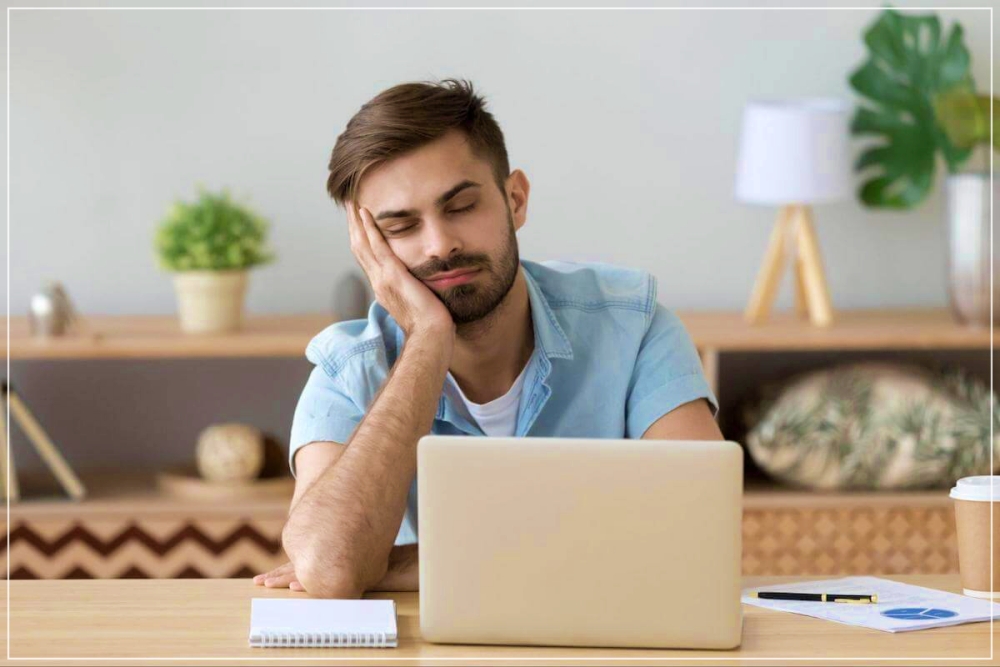Why do I keep falling asleep when I sit down? Do you sometimes ask yourself this question? This article will answer and explain everything…
Have you ever found yourself nodding off when you’re sitting down, even though you’re not particularly tired? It’s a common problem that many of us face, and it can be frustrating when it happens in the middle of an important meeting or while you’re trying to relax at home. But why does it happen?

There are a few possible explanations for why we might feel sleepy when we’re sitting down. One is simply that sitting still for long periods of time can make us feel lethargic and less alert. Another is that our bodies are programmed to associate sitting down with rest and relaxation, so we naturally feel more inclined to fall asleep in this position. Additionally, some medical conditions or medications can cause drowsiness as a side effect, so it’s important to rule out any underlying health issues if you’re experiencing excessive sleepiness.
If you’re struggling with this issue, don’t worry – there are plenty of things you can do to help stay alert and awake when you’re sitting down. From taking regular breaks to stretching your legs, to drinking plenty of water and avoiding caffeine and heavy meals, there are many simple strategies that can help you feel more awake and focused throughout the day. So if you’re tired of feeling sleepy every time you sit down, read on for some helpful tips and tricks to keep you feeling alert and energized.
Understanding Sleepiness – Why Do You Keep Falling Asleep When You Sit Down?
What Causes Sleepiness?
When we feel sleepy, it is usually because our body is telling us that we need rest. There are several factors that can cause sleepiness, such as:
- Lack of sleep: If we do not get enough sleep, we will feel tired and sleepy during the day.
- Poor sleep quality: Even if we get enough sleep, if the quality of our sleep is poor, we may still feel sleepy.
- Sleep disorders: Sleep disorders such as sleep apnea, narcolepsy, and restless leg syndrome can cause excessive daytime sleepiness.
- Medications: Certain medications can cause drowsiness as a side effect.
The Role of Circadian Rhythm
Our circadian rhythm is our body’s internal clock that regulates our sleep-wake cycle. When our circadian rhythm is disrupted, we may feel sleepy during the day. Some factors that can disrupt our circadian rhythm include:
- Shift work: Working at night or rotating shifts can disrupt our circadian rhythm.
- Jet lag: Traveling across time zones can disrupt our circadian rhythm.
- Electronic devices: The blue light emitted by electronic devices can disrupt our circadian rhythm and make it harder for us to fall asleep at night.
Other Factors that Affect Sleepiness
There are several other factors that can affect our sleepiness, such as:
- Diet: Eating heavy meals or consuming caffeine or alcohol can make us feel sleepy.
- Physical activity: Lack of physical activity can make us feel sleepy during the day.
- Mental health: Depression, anxiety, and stress can cause excessive daytime sleepiness.
Understanding the factors that contribute to sleepiness can help us make changes to our lifestyle and habits to improve our sleep quality and reduce daytime sleepiness.
Medical Conditions that Cause Sleepiness
Sometimes, feeling drowsy when sitting down is not just a result of being tired. It can also be a sign of an underlying medical condition. Here are some examples of conditions that can cause sleepiness:

Sleep Apnea
Sleep apnea is a condition where breathing repeatedly stops and starts during sleep. This can lead to poor quality sleep and daytime sleepiness. People with sleep apnea may not even realize they have it, but they may notice that they often wake up feeling tired or with a headache. Treatment for sleep apnea may involve using a continuous positive airway pressure (CPAP) machine to help keep the airway open while sleeping.
Narcolepsy
Narcolepsy is a neurological disorder that affects the brain’s ability to regulate sleep-wake cycles. People with narcolepsy may experience sudden and uncontrollable sleep attacks, even during the day. They may also have cataplexy, which is a sudden loss of muscle tone that can cause them to collapse. Treatment for narcolepsy may involve medication and lifestyle changes.
Restless Leg Syndrome
Restless leg syndrome (RLS) is a condition where people feel an uncomfortable sensation in their legs, often described as a “creepy-crawly” feeling. This can make it difficult to fall asleep or stay asleep, leading to daytime sleepiness. Treatment for RLS may involve medication and lifestyle changes.
Insomnia
Insomnia is a condition where people have trouble falling asleep or staying asleep. This can lead to daytime sleepiness and fatigue. Insomnia can be caused by a variety of factors, including stress, anxiety, depression, and certain medications. Treatment for insomnia may involve medication and lifestyle changes.
In conclusion, if you find yourself feeling excessively sleepy when sitting down, it may be worth talking to your doctor to see if an underlying medical condition is to blame. With the right treatment, you can get back to feeling alert and awake during the day.
Lifestyle Factors that Contribute to Sleepiness
Lack of Sleep
We all know that not getting enough sleep can make us feel tired during the day. However, many of us still don’t prioritize sleep as much as we should. Adults need 7-9 hours of sleep per night, and teenagers need even more. When we consistently don’t get enough sleep, our bodies start to feel the effects. We may feel groggy, irritable, and have trouble concentrating. This can lead to falling asleep when we sit down, even if we’re not particularly tired.
Poor Sleep Quality
Even if we’re getting enough hours of sleep, poor sleep quality can still make us feel sleepy during the day. Sleep apnea, snoring, or other sleep disorders can disrupt our sleep and prevent us from getting the rest we need. Additionally, sleeping in a room that’s too hot, too cold, or too noisy can also affect our sleep quality.
Sedentary Lifestyle
When we don’t move around enough during the day, our bodies can start to feel sluggish. Sitting at a desk for long periods of time can make us feel sleepy, especially if we’re not getting up and moving around every so often. Exercise can help us feel more alert and awake, as well as improve our overall health.
Diet and Nutrition
The food we eat can also affect our energy levels. Eating a diet that’s high in sugar and processed foods can cause our blood sugar levels to spike and then crash, leaving us feeling tired and sluggish. Additionally, not drinking enough water can lead to dehydration, which can also make us feel tired.
In summary, there are several lifestyle factors that can contribute to feeling sleepy when we sit down. Prioritizing sleep, improving sleep quality, staying active, and eating a healthy diet can all help us feel more alert and awake during the day.
Falling Asleep When Sitting Down – Tips to Prevent Sleepiness
Get Enough Sleep
One of the most important things we can do to prevent sleepiness is to ensure that we get enough sleep. This means aiming for seven to eight hours of sleep each night. We can also try to maintain a consistent sleep schedule, going to bed and waking up at the same time every day. This helps regulate our body’s internal clock and can make it easier to fall asleep and wake up feeling rested.
Improve Sleep Quality
In addition to getting enough sleep, we should also focus on improving the quality of our sleep. This means creating a sleep-conducive environment, such as a quiet, cool, and dark bedroom. We should also have a comfortable mattress or invest on the best mattress topper, and pillow,… We can also try relaxation techniques, such as deep breathing or meditation, to help us fall asleep faster and stay asleep longer.

Regular Exercise
Regular exercise is another great way to prevent sleepiness. Exercise can help improve our overall health and reduce stress, which can lead to better sleep. We should aim for at least 30 minutes of moderate-intensity exercise most days of the week. However, we should avoid exercising too close to bedtime, as this can actually make it harder to fall asleep.
Healthy Eating Habits
Our eating habits can also affect our sleep. We should aim to eat a balanced diet that includes plenty of fruits, vegetables, whole grains, and lean protein. We should also avoid eating large meals or consuming caffeine or alcohol too close to bedtime, as these can interfere with our sleep.
By following these tips, we can help prevent sleepiness and improve the quality of our sleep. Remember, getting enough sleep is essential for our overall health and well-being.
I can totally relate to this! It’s so frustrating when I find myself falling asleep while sitting down, even when I’m not tired. This article seems like a helpful resource to understand why it happens and provides great tips to stay alert. I’m definitely going to try some of these suggestions and prioritize my sleep and overall health. Thanks for sharing this informative article!